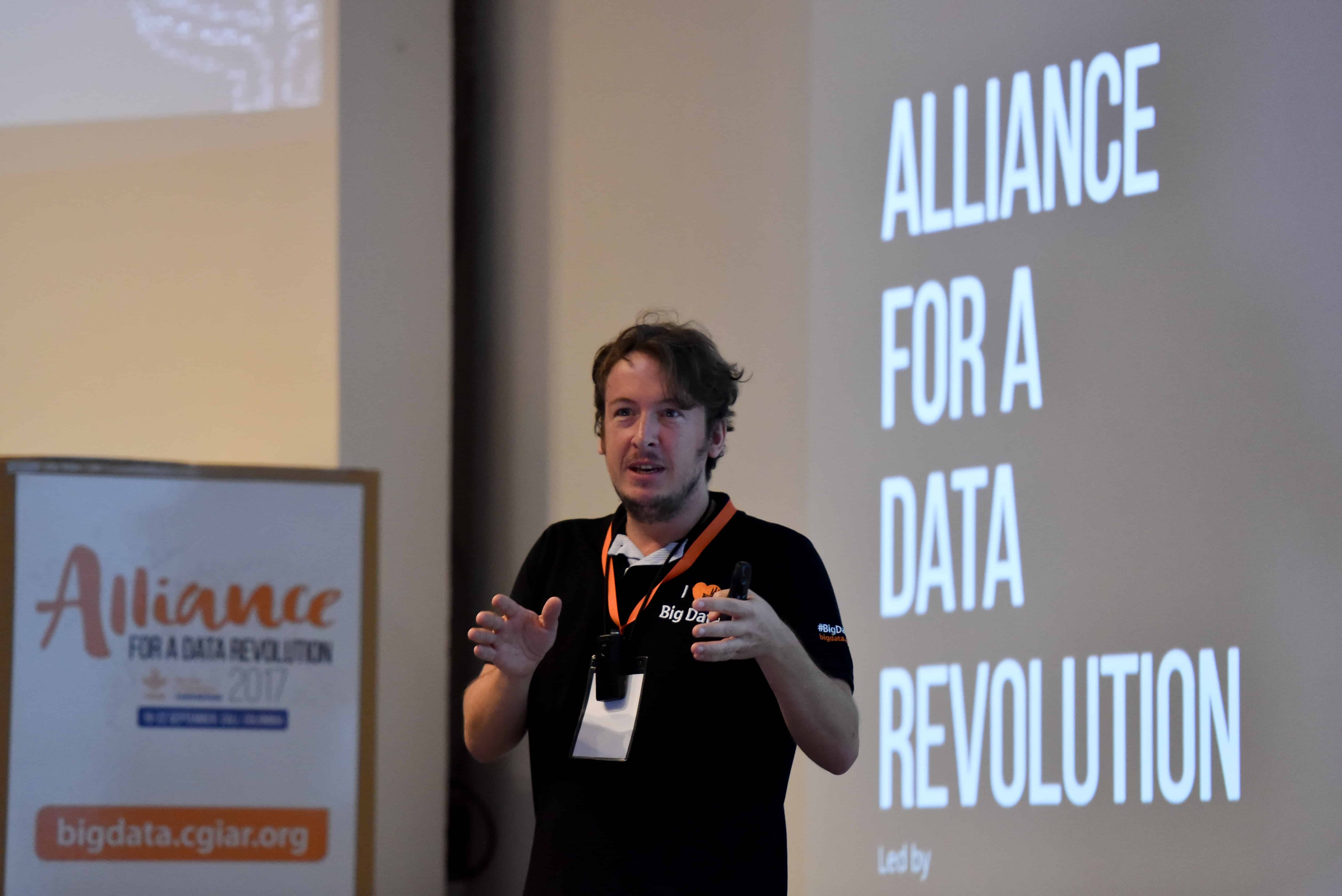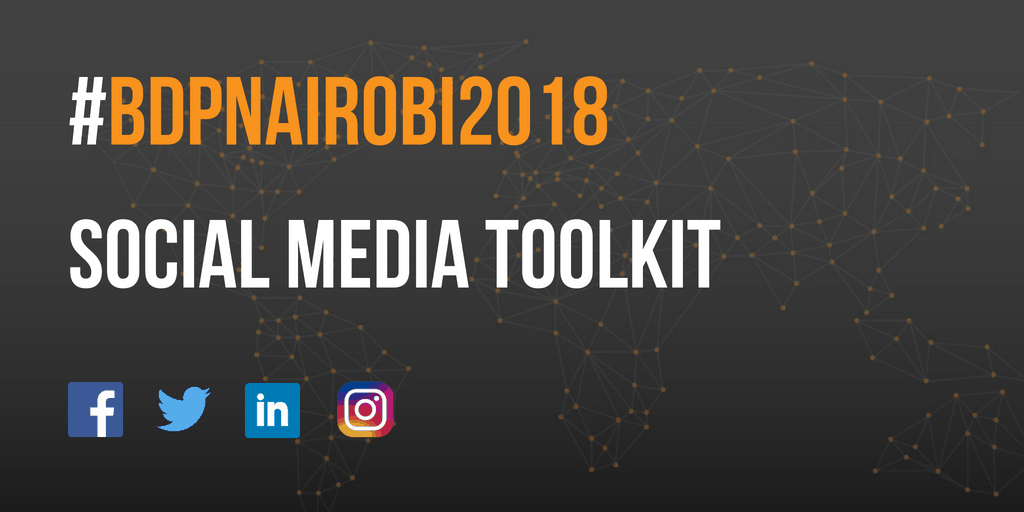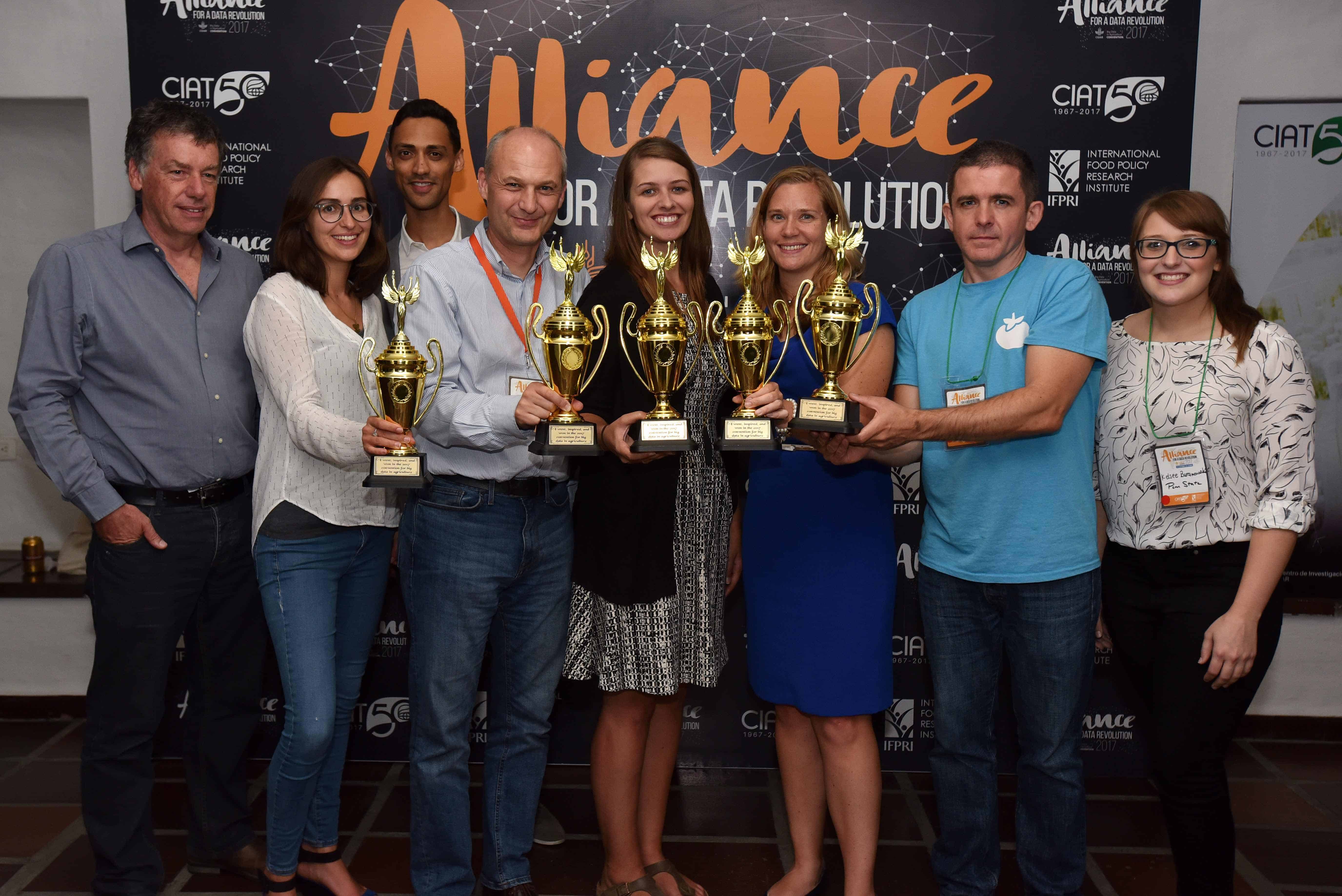Media Kit
Big Data in Agriculture Convention 2018Decoding the Data Ecosystem Big Data in Agriculture Convention
3-5 October 2018 Nairobi, Kenya
#BDPNAIROBI2018
@CGIAR_DATA
Quick links:
The platform
The CGIAR Platform for Big Data in Agriculture is where information becomes power: power to predict, prescribe, and produce more food, more sustainably. It aims to democratize decades of agricultural data empowering analysts, statisticians, programmers and more to mine information for trends and quirks, and develop rapid, accurate and compelling recommendations for farmers, researchers and policymakers.
The event
At the 2nd Annual Big Data in Agriculture Convention, we’ll dive into ways the data ecosystem for food security can integrate with real ecosystems worldwide, from the global to the local, across public, private, and non-profit goods. This year’s theme is “Decoding the Data Ecosystem.” The Convention will highlight data-driven approaches to multi-scale food systems analysis, landscapes, ecosystem services, and the special role of animal science in building resilient food systems worldwide. You can expect to hear from more than 140 speakers and industry experts during more than 45 sessions over the course of three days. We’ve structured the program to be dynamic and interactive. In addition to hosting structured panel sessions, we are providing deep-dive breakout sessions and intimate Q&A’s where you will have direct access to put your burning questions to leading experts in the data science sector. Like last year, will be closing the event with a bang by announcing the winners of the 2018 Inspire Challenge in a special awards ceremony. We are expecting at least 300 members of the scientific community and digital agriculture practitioners who make the Platform for Big Data in Agriculture successful.
Key messages
- The data ecosystem for global food security is complex. It is nothing less than all information infrastructures, enabling policies, data sources, modeling and analytic approaches, applications and tools used to capture, store, analyze and apply data for impact in society and in the natural world.
- The data ecosystem for food security is also incomplete. The data sources, communications, and connections for food security must bridge scientific disciplines, market and food systems, social and political realities.
- Data must integrate with natural ecosystems worldwide, from the global to the local, across public, private, and non-profit goods, if humanity is to build the food secure future.
- The agricultural sector lags behind all others in terms of digitalization. If we are to change that we need the agriculture people to be innovating with the tech world.
- We have decades of unstructured agricultural data that used to be locked up that are now made available. We need to make data interoperable.
Quotes
Are you writing articles about the Convention? We’ve prepared these quotes ready for use. We will be updated throughout the event.
Please share your stories with Marianne, our Head of Communications (m.mcdade@cgiar.org) so we can help promote your piece!
We need to develop and encourage new alliances between the technology and agriculture sectors if we’re going to successfully digitize smallholder farming.
Elwyn Grainger-Jones, Executive Director, CGIAR System Organization
Today, we need to accelerate the digitization of the global infrastructure for human adaptation and link it to public, private, and non-profit actors across the world so we can play an even greater role in enabling a food secure future. Big Data has the potential to push the limits of what is possible and to transform the media of agricultural life in developing countries.
Brian King, CGIAR Platform for Big Data in Agriculture Coordinator
We want to encourage universities, research organisations, and NGOs everywhere to treat their datasets as global public goods, and share them so that number crunchers can mine them for trends, anomalies and clues about the future. Since the agricultural sector lags behind all others in terms of digitalization, and if we are to change tat we need the ‘ag people’ to be innovating with the tech world.
Andy Jarvis, Co-pioneer of the CGIAR Platform for Big Data in Agriculture, (CIAT/CCAFS)
We have decades of agricultural data that used to be locked up that are now made available. Most of them are unstructured, so it’s kind of a mess. That’s why we need to be more serious about standardization, to make data interoperable.
Daniel Jimenez, Data-Driven Agronomy Community of Practice Lead (CIAT)
Accelerating innovation and impact to effectively address global agricultural challenges requires that data be easily aggregated and integrated, which in turn necessitates interoperability.
Medha Devare, Organize Module Lead, CGIAR Platform for Big Data in Agriculture
Key themes up for discussion
- Building the data ecosystem for resilient food systems: Lessons and the way forward in Kenya. There will be a scheduled press meeting with Joseph Mucheru, Kenyan Cabinet Secretary, Ministry of Information and Communications
- Who is using Big Data in Kenya, what are some barriers to better use of data, and what are some solutions?
- Data management & information security issues
- Protecting individual privacy, privacy regulations, the “right to be forgotten” and the “right to be remembered”
- Inspire Challenge 2018 finalists
- Data integrity issues: Acknowledging that misuse or disuse of data has real-world consequences
- World Animal Day: livestock and fisheries data-driven opportunities
- The democratization of Earth observation and the impact on agricultural research and development. Current use of remote sensing data in agriculture and real-time monitoring of food security in Africa.
- Blockchain in food systems
- Channels, chains and food systems: the challenges and opportunities of digitizing food systems in developing economies
- Gender and the data ecosystem: using big data and big data tools in strategic gender research to build socially inclusive, resilient food systems worldwide
- Digitizing food systems: The use of (anonymized) transactions data, mobile network metadata, and supply chain traces is unlocking the ability to observe and understand whole value chains and food systems in action, and engaging with a speed and scale in building the resilient food systems that the world needs.
- Innovations in mobile finance and its potential to revolutionize agricultural markets
- Farmer identity. What agricultural data is readily available to build an “economic identity”, and how can this be used by those who provide smallholder farmer financing?
- Precision agriculture using digital technologies. How soil, crop, seed, and weather data analytics and machine intelligence can provide precise advice to farmers and how blockchain for traceability & provenance can solve both supply chain problems and fair price issues
- Open access to data vs copyright
Key Speakers
Hon. Joseph Mucheru
Cabinet Secretary, Ministry of Information and Communications, Republic of Kenya

Brian King
Coordinator, CGIAR Platform for Big Data in Agriculture
Brian King is the Coordinator of the CGIAR Platform for Big Data in Agriculture. He previously worked for USAID as a Senior Digital Agriculture Development Advisor.
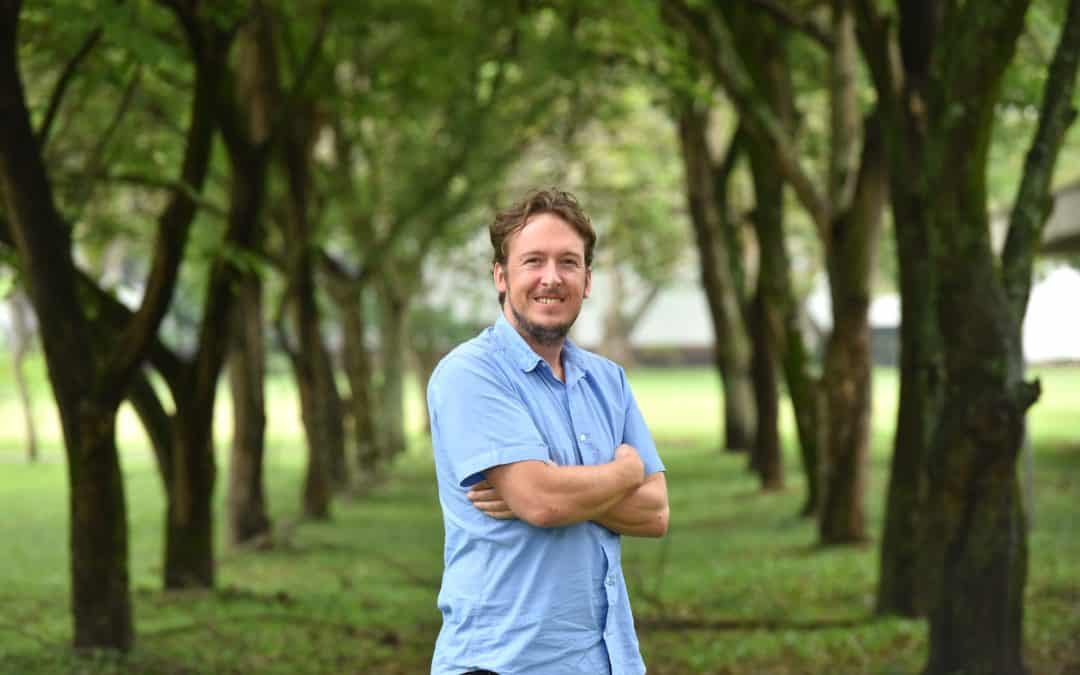
Andy Jarvis
DAPA Research Area Director, CIAT
Andy Jarvis is the Director of the Decision and Policy Analysis Area at the International Centre for Tropical Agriculture (CIAT) and a Flagship Leader at the CGIAR Research Program for Climate Change, Agriculture and Food Security (CCAFS), based in Cali, Colombia. He also co-founded the CGIAR Platform on Big Data in Agriculture.
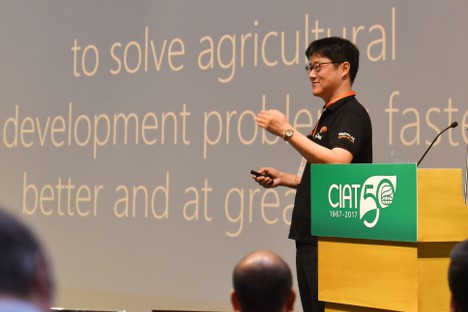
Jawoo Koo
DAPA Research Area Director, CIAT
Jawoo Koo leads the Spatial Data and Analytics Theme at IFPRI. He is the Geospatial Data Community of Practice Lead of the CGIAR Platform for Big Data in Agriculture. He holds a Ph.D. in Agricultural and Biological Engineering from the University of Florida.
Medha Devare
Senior Research Fellow & Module Lead, IFPRI/Big Data Platform
Medha is a cropping systems agronomist with familiarity working in the US and developing countries.
Tonya Nyakeya
Africa Ecosystem & Program Lead, IBM Research
Chief Dot Connector, Program Management and Client Engagement Specialist with experience from both public and private sector with a penchant interest for research, science, technology, and innovation
Marieke de Ruyter de Wildt
CEO, The Fork
After 15 yrs of working farm data in over 40 countries, Marieke fully focuses on smart data management for more integer food systems.
Allen Day
Science Advocate, Google
Allen Day is a Developer Advocate for Google Cloud. He’s focused on healthcare and computationalbiology applications of AI and BigData technologies. Allen holds a PhD in Human Genetics from theSchool of Medicine at UCLA.
Billy Jack
Professor, Georgetown University
Billy Jack is a professor in the Department of Economics in the College and co-director of the Georgetown University Initiative on Innovation, Development and Evaluation, or gui2de.
KEY TEAM MEMBERS
Brian King, CGIAR Platform for Big Data in Agriculture Coordinator.
Email: b.king@cgiar.org
Marianne McDade, Head of Communications, CGIAR Platform for Big Data in Agriculture.
Email: m.mcdade@cgiar.org
Medha Devare, Module Lead, CGIAR Platform for Big Data in Agriculture.
Email: m.devare@cgiar.org
Jawoo Koo, Geospatial Data Community of Practice Lead, CGIAR Platform for Big Data in Agriculture.
Email: j.koo@cgiar.org.
Andy Jarvis, Co-pioneer of the CGIAR Platform for Big Data in Agriculture.
Email: a.jarvis@cgiar.org.
PARTNERS
The CGIAR Platform for Big Data in Agriculture is co-led by the International Center for Tropical Agriculture (CIAT) and the International Food Policy Research Institute (IFPRI). The Convention is co-hosted by the World Agroforestry Centre (ICRAF) and the International Livestock Research Institute (ILRI).
DESIGN AND LOGO RESOURCES
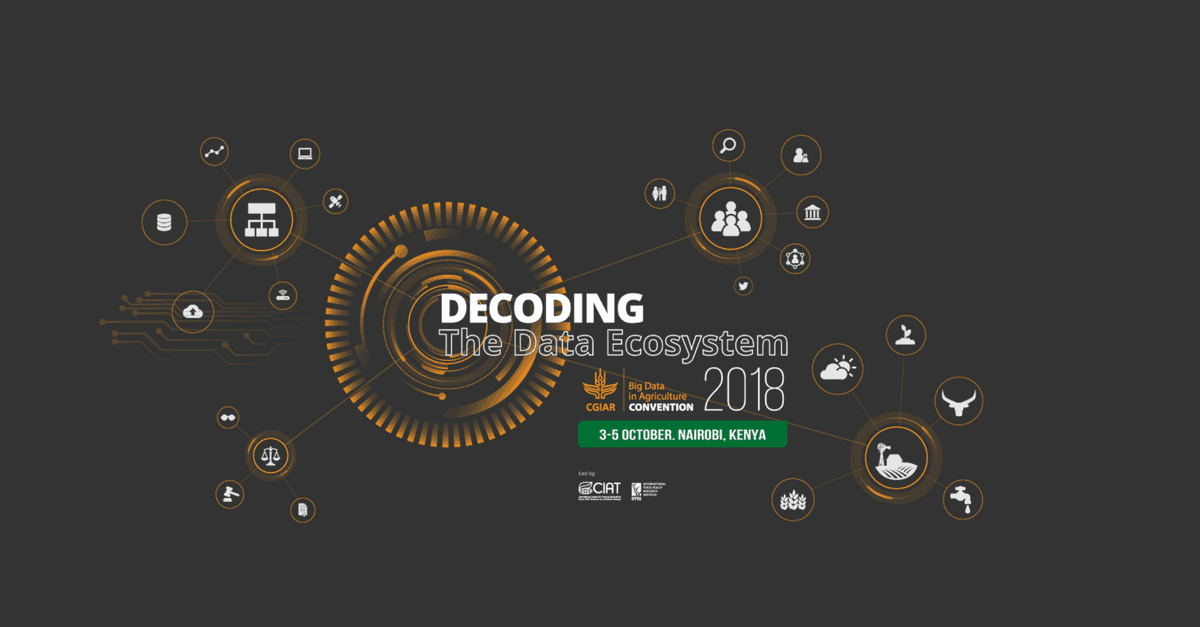
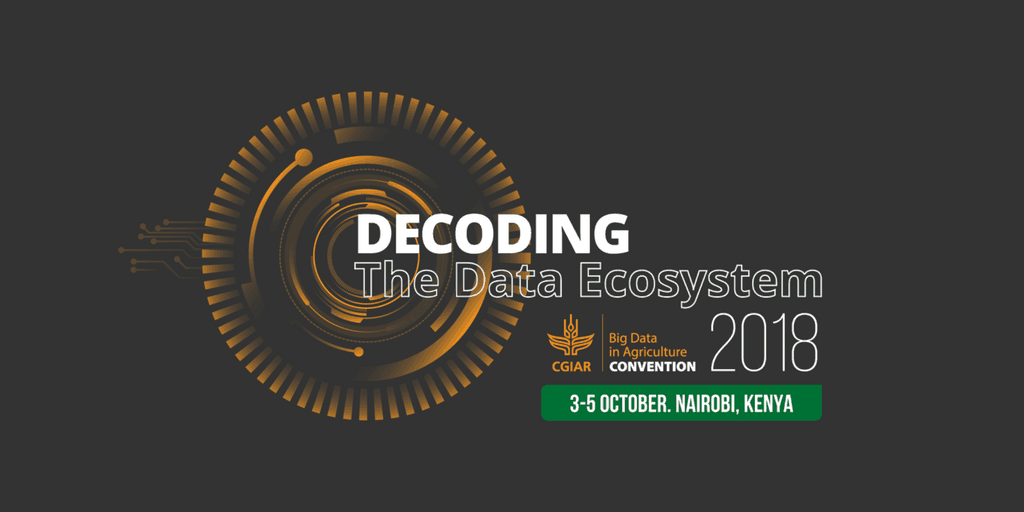
More resources at: https://drive.google.com/drive/folders/1Bm4jNDn-yYXFlBcnRG01Da4fMl6jg99U
Looking back on the 2017 Convention
We held our first Big Data in Agriculture Convention: An Alliance for a Data Revolution last year and it was a big success. Over 300 participants from the international scientific community gathered to discuss ways in which big data can transform smallholder agriculture, enabling farmers to boost food production and respond to pressing challenges such as climate change. At the Convention, we awarded five research proposals, the 2017 Inspire Challenge grant winners, with US$100K each. Press release: Big Data in Agriculture Convention of 2017: An Alliance for a Data Revolution
